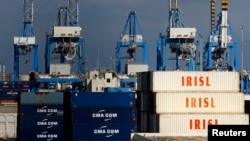Later this month the United Nations hosts an important review conference for the nuclear Nonproliferation Treaty (NPT) - the landmark deal aimed at preventing the spread of nuclear weapons. This year's review is expected to be highly contentious and could test the treaty's viability.
The cornerstone treaty of nuclear disarmament and non-proliferation, which went into force in 1970, is reviewed by its signatories every five years.
There is anticipation there may be some drama this time around if Arab states declare they are no longer willing to accept the status quo of being signatories while Israel, which is widely presumed to have a nuclear arsenal, is not.
The proliferation challenges posed by Iran and North Korea will also be on the agenda of the 2015 review, which will begin April 27 at U.N. headquarters in New York and last a month. That is just 25 days after a tentative agreement on curbing Iran's nuclear programs.
Iran is a signatory to the NPT, accepted by more than 180 U.N. member states. North Korea, however, withdrew in 2003.
VOA News asked Adam Scheinman, the special representative of the U.S. president for nuclear non-proliferation, what the NPT review conference is expected to accomplish in regards to North Korea.
“Not too much. We can certainly note that North Korea stands apart from its commitments. We can call for North Korea not to take additional actions that would create a more difficult situation in the region by conducting nuclear tests or further ballistic missiles tests and what have you. And we hope that that type of language would be endorsed by the review conference,” said Scheinman.
The ambassador said the United States hopes Pyongyang will understand such statements highlight its isolation from the international community.
Ambassador Scheinman, speaking from Washington to reporters on a conference call, pointed out North Korea has not abandoned its nuclear programs, as it pledged in previous talks and in a 2005 joint statement.
“We would like to see the diplomatic process succeed but North Korea needs to come to the table with the attitude that it's prepared to abandon its nuclear programs as it had committed. So the ball is in the North Korean court in that regard,” he said.
The ambassador said China will continue to play an important role in addressing the North Korean nuclear challenge.
“We have worked with China over the years to pursue and to bring North Korea into the six-party talk framework and that continues. We have very frequent discussions with China. Our diplomats speak with Chinese diplomats very often on the issues of North Korea's nuclear program and efforts to return North Korea to the diplomatic process. And I can assure you that will continue,” said Scheinman.
North Korea initially proved its nuclear weapons capability with a successful underground atomic test in 2006. It is believed to have enough plutonium for at least a half dozen nuclear bombs and is believed capable of making uranium-fueled weapons.
Scientists and intelligence analysts are engaged in a continuing debate on just how much progress North Korea has made towards its goal of being able to deploy a nuclear weapon on a long-range ballistic missile.
Besides North Korea, the other countries with nuclear arsenals that are not currently parties to the NPT are India, Israel and Pakistan.
Analysts are concerned that North Korea's nuclear arsenal and anxiety about Chinese military expansion could lead countries such as Japan and South Korea to consider possessing their own nuclear weapons, despite their NPT signatures. Both countries fall under the protection of the U.S. nuclear umbrella.
In the Middle East, doubts about the sincerity of Iran's pledge to not build atomic bombs has fueled fears Saudi Arabia could pursue its own nuclear weapons program.

